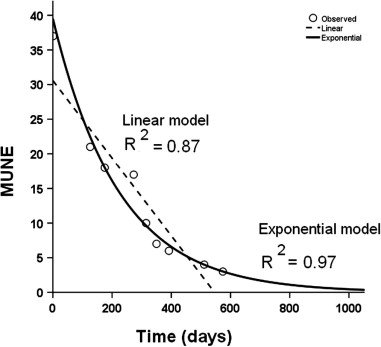Like... very much so. I would say, depending where you are in your weight loss, 30-80% inaccurate (with regards to difference between the suggested rate you're losing at versus the rate you're actually losing at) as you get to low bodyfat since it assumes weight loss is linear (like the dotted line) when really it's exponential (solid line). You lose weight very quickly if you're very overweight, but this progressively slows down as you approach your set point. It assumes you keep losing at the same rate but that's impossible, since your weight loss must naturally slow down the less muslce and fat you have, and as you approach closer and closer to pure bone (which you're not going to lose much of). It can get extremely inaccurate to the point of 100%; for example, see
@WhisperThin's post above. After 1 year she'll weight 0 pounds, lulz.
Factors like frame size, muscle and fat disribution also play a huge role that's not considered: if person a and person b weight the same and have the same frame size, but person A has a larger ratio of muscle-to-fat, they will lose at a faster rate since muscle cells metabolize more than fat cells. If person a and person b weigh the same, have the same muscle to fat ratio, but person a has a larger frame, they will lose at a slow rate than person b, because they have less fat/protein mass versus bone mass, and therefore less "loseable" weight overall.








